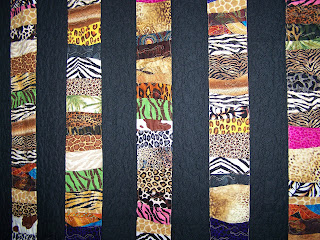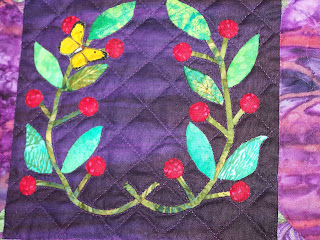Today is the birthday of several writers of popular literature. Louis L'Amour was born in 1908, and by the time he died, 80 years later, he had written 89 novels and over 250 short stories. Wow. he's most famous for his Westerns, but he also wrote historical fiction, poetry, science fiction, and non-fiction. Much of his work is still in print. Your English major self, your inner Literature Ph.D. might sneer at the quality of his work, but clearly something in his work spoke to readers of all sorts.
James Patterson was also born today.
Today's post on
The Writer's Almanac tells us: "He has published more than 70 novels, and according to recent data, he outsells Stephen King, Dan Brown, and John Grisham combined." I must confess that his novels are too scary for me, with their tales of kidnapped women and torture. No thanks. But clearly, he's doing something right in terms of appealing to readers.
Here's a quote for the next time you write fiction: "If you think of the story that you tell that's your favorite personal story, or funny story, it doesn't have flashy sentences. It doesn't have too much detail. It just tells the story. That isn't, for whatever reason, the way most people write books. But it seemed to me that there was no reason that it couldn't be the way at least one person writes books. I said: 'I'm going to stop writing the parts that people skim.'"
Today is also the birthday of Billy Collins. I have never understood why so many people, particularly poets, dismiss his work. Much of his work passes my test for poetry, which means it makes me see the world in a way I hadn't seen it before. He does interesting things with image, metaphor, and symbolism. Sure his work is rooted in the every day, but so what? His work is accessible, but I see that as a plus, not a minus. Who can count the number of people who love poetry because of Billy Collins? He's done us all a great service.
Do poets sneer out of jealousy? I suspect so. But what would happen if we refused to see success as a zero sum game? Just because Billy Collins is successful doesn't mean that we can't be. In fact, because Billy Collins is successful, there's a greater chance for the rest of us.
Long ago, at the beginning of this century, I heard Billy Collins interviewed on NPR's
Fresh Air (if it's in the archives, I can't find it). He read the poem
"Taking Off Emily Dickinson's Clothes" and talked about what inspired it. He said he had read
Galway Kinnell's "Oatmeal," and his brain launched from there.
Let's take a moment to think about how much life has changed. Upon hearing this interview, I went to the public library to check out a copy of the Kinnell book which had the poem. Now, you'll see, I can link to it.
I read both of these poems, and felt my brain expand. I wrote the poem below. I've had a few readers tell me it's their favorite poem. And once, I went to be a guest poet at my friend's Brit Lit class. They were studying the Romantic poets, and I talked about how their work inspired mine. The students were intrigued, and a few stayed after class to thank me. It was very rewarding.
The poem below is one of the poems I read. I've often wondered if readers with no knowledge of the Wordsworths would understand it. Happily, we live in an age of easy Internet searches.
And if you're a creative writing teacher, I've taught the Collins poem, the Kinnell poem, sometimes my own poem, and had students write something similar, either with a real life person from the past or a character from a book, a movie, a TV show, some other element of popular culture. It works very well for a lot of students--and sometimes, they come up with surprising juxtapositions.
This poem is part of my first chapbook,
Whistling Past the Graveyard. I suspect the long lines will be scrambled on some of your computer screens, and I apologize in advance.
Waiting
“I am aware it is not good to eat oatmeal alone.”
Galway Kinnell
“Oatmeal”
I invite the Wordsworths over for breakfast.
William sits in my gloomy kitchen waiting for someone to bring him tea.
I encourage Dorothy to sit down.
After all, she has spent so many of her years waiting
on others, waiting for others.
The least I could do is fix her breakfast.
I have the menu planned, a bit heartier than my usual fare.
I try to cook, but Dorothy is having none of this.
Baffled at first by the pre-sliced bread, she tries to create thinner slices
and promptly cuts her finger.
Blood seeps through the stained tea towel (how can I be out of Band-aids?).
I assure her that I don’t mind.
The kettle shrieks amidst this chaos.
William sits in his chair waiting,
forever waiting for someone to bring him his tea.














































